What Is the Best Diet for Chinchilla Health and Wellness?
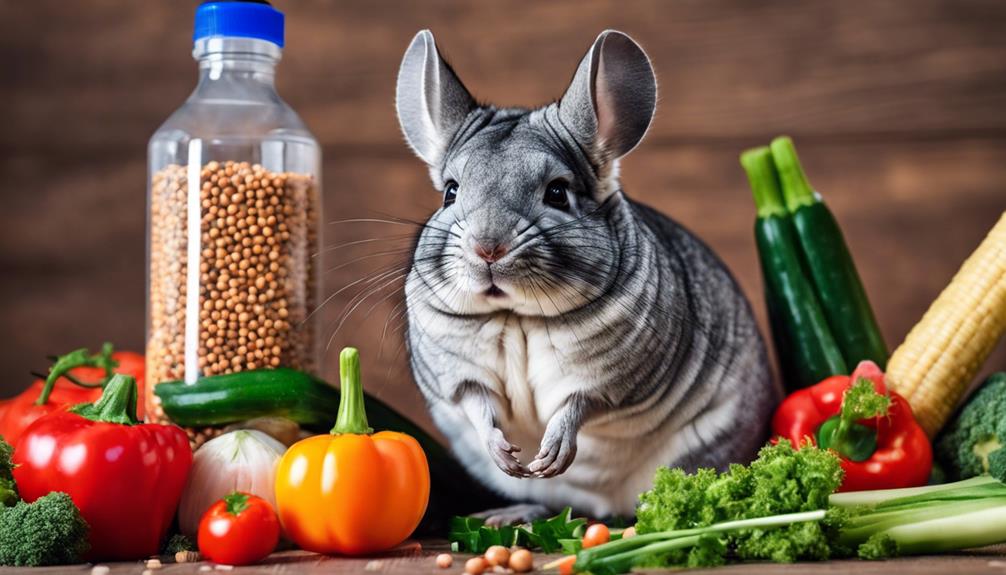
Chinchillas are herbivores that require a diet high in fiber to maintain their digestive health. Hay should make up the majority of their diet, with fresh water always available. Pellets formulated specifically for chinchillas can provide additional nutrients. Fruits and vegetables can be given in moderation as treats, but too much can upset their sensitive digestive systems. It’s important to avoid sugary or high-fat treats, as they can lead to obesity and other health issues. Adequate nutrition is key to keeping chinchillas healthy and happy.
Nutritional Requirements for Chinchillas
Chinchillas require a diet that’s high in fiber to maintain optimal health and wellness. Ensuring a proper balance of nutrients is crucial for their digestive health. Fiber intake is essential for chinchillas as it aids in digestion and prevents gastrointestinal issues. Along with a fiber-rich diet, chinchillas may also benefit from vitamin supplements to meet their dietary balance requirements. Vitamin supplements can help address any deficiencies that may arise from their regular food intake.
To promote overall well-being, chinchillas should have access to a variety of fresh hay, pellets, and occasional treats. Hay serves as a vital component of their diet, providing the necessary fiber content. Pellets can supplement their hay intake, but it’s crucial to choose high-quality pellets specifically formulated for chinchillas. Treats should be given sparingly to prevent dietary imbalances. By carefully monitoring their nutritional intake and providing a well-rounded diet, chinchilla owners can support the health and longevity of their furry companions.
Hay: The Foundation of Their Diet
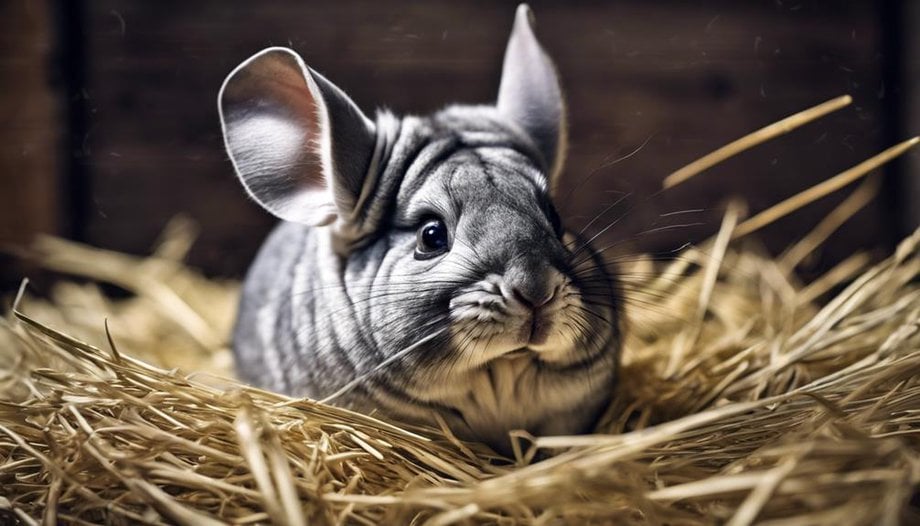
Chinchillas rely heavily on hay as the cornerstone of their diet, with different varieties offering essential nutrients. Ensuring the hay is fresh and dust-free is crucial for the chinchilla’s respiratory health and overall well-being.
Quality hay plays a vital role in meeting their dietary requirements and promoting digestive health.
Nutrient-Rich Hay Varieties
Among the various nutrient-rich hay varieties essential for maintaining chinchilla health and wellness, timothy hay stands out as a staple choice due to its high fiber content and optimal nutritional profile. Here are some important factors to consider when selecting hay for chinchillas:
- Freshness: Ensure the hay is fresh to provide the highest nutritional value.
- Color and Smell: Look for green-colored hay with a fresh grassy smell, indicating quality.
- Texture: Opt for hay with a soft, leafy texture, as chinchillas prefer this type.
- Variety: Offer a variety of hays like orchard grass or meadow hay to add interest to their diet.
Fresh and Dust-Free
Selecting fresh and dust-free hay is crucial as it forms the foundation of a chinchilla’s diet, ensuring optimal health and wellness. Chinchillas rely on hay for proper digestion and to wear down their teeth. In addition to providing essential nutrients, hay plays a significant role in their behavioral needs, such as promoting natural foraging behaviors and preventing boredom. Dust bathing is a vital activity for chinchillas, helping to keep their fur clean and healthy. Furthermore, incorporating environmental enrichment through playtime is essential for their mental stimulation and overall well-being. Ensuring the hay is of high quality and free from dust is key to supporting these aspects of a chinchilla’s health and happiness.
| Benefits of Fresh and Dust-Free Hay | |||
|---|---|---|---|
| – Proper digestion | – Natural foraging | – Clean and healthy fur | – Mental stimulation |
| – Teeth wear-down | – Prevents boredom | – Environmental enrichment through playtime | – Optimal health |
Hay Quality Importance
To maintain optimal health and wellness in chinchillas, ensuring the hay they consume is of high quality and free from dust is fundamental. High-quality hay serves as the cornerstone of their diet, providing essential fiber that aids in digestion and dental health.
Here are four crucial points to consider regarding hay quality:
- Hay Storage: Proper storage in a dry, well-ventilated area prevents mold growth and maintains freshness.
- Feeding Behavior: Chinchillas have a natural inclination to forage, so offering good quality hay encourages this behavior and keeps them mentally stimulated.
- Nutrient Content: Quality hay ensures that chinchillas receive the necessary nutrients for overall health and vitality.
- Dust-Free Hay: Dust-free hay reduces the risk of respiratory issues and promotes better respiratory health in chinchillas.
Fresh Water: Hydration Is Key
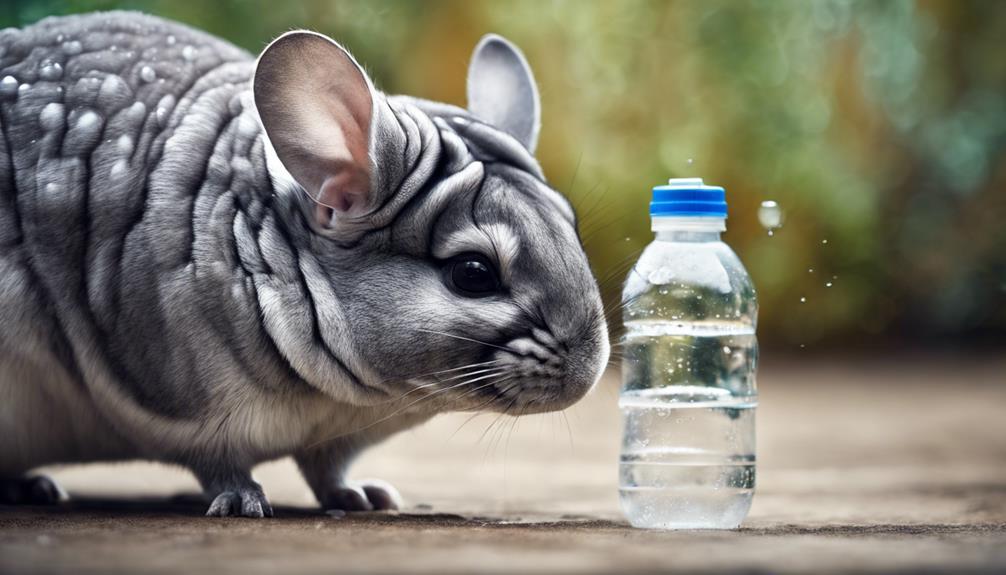
Ensuring chinchillas have access to clean, fresh water at all times is essential for maintaining their health and wellness. Water quality and cleanliness are paramount to prevent illnesses and ensure proper hydration, which is crucial for their digestion. Chinchillas are prone to dehydration, so having a fresh supply of water is vital.
Change their water daily and use a sipper bottle to prevent contamination. Make sure the water is at room temperature, as chinchillas may refuse cold water. It’s recommended to use filtered or purified water to avoid any harmful chemicals present in tap water. Monitoring their water intake is important; a decrease could signal health issues.
Chinchillas may also enjoy occasional misting with water to help regulate body temperature. By prioritizing fresh water availability and quality, chinchilla owners can contribute significantly to their pets’ overall health and well-being.
Pellets: A Vital Component
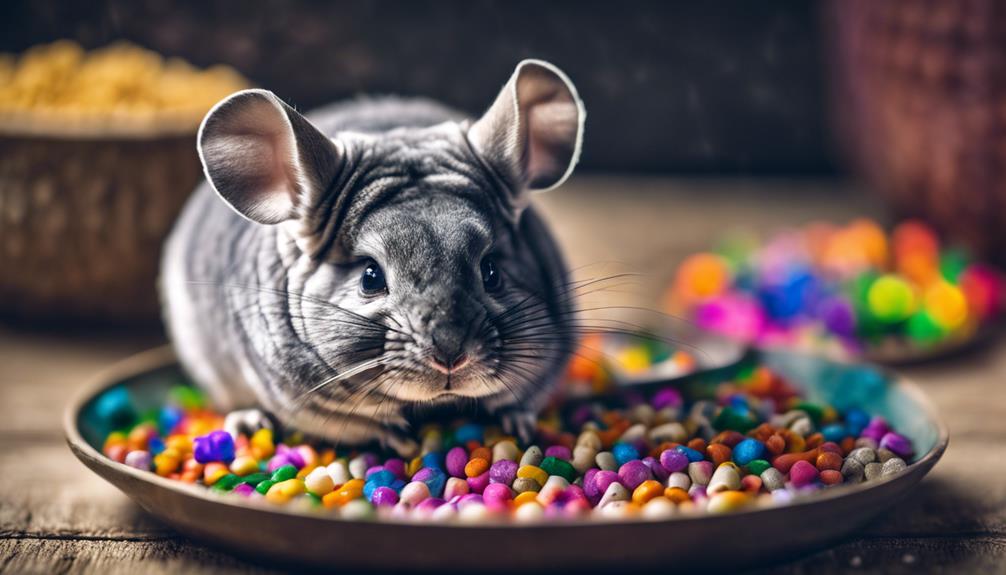
Nutritional pellets are a fundamental aspect of a chinchilla’s diet, providing essential vitamins and minerals necessary for their health and well-being.
The frequency of pellet feeding should be carefully monitored to prevent overconsumption and potential health issues.
Understanding the nutritional content and recommended feeding schedule for pellets is crucial in maintaining a balanced diet for chinchillas.
Nutritional Pellet Options
When selecting nutritional pellet options for your chinchilla’s diet, consider the ingredient quality and nutrient content to ensure optimal health and wellness. Here are some important factors to keep in mind:
- Pellet options: Compare different brands to find one that offers a well-rounded nutritional profile.
- Nutritional balance: Look for pellets that provide a good balance of fiber, protein, fat, and essential vitamins and minerals.
- Ingredient analysis: Check the ingredient list to ensure it contains high-quality, natural ingredients without added sugars or artificial additives.
- Customer reviews: Consider feedback from other chinchilla owners to gauge the palatability and effectiveness of the pellets.
Pellet Feeding Frequency
To ensure optimal health and wellness for your chinchilla, the frequency of feeding pellets, a vital component in their diet, plays a crucial role in meeting their nutritional needs. Chinchillas have specific feeding habits that require attention to portion control to prevent overeating, which can lead to digestive issues. Proper pellet feeding frequency is essential for maintaining digestive health and supporting a balanced gut flora. Here is a table summarizing the recommended pellet feeding frequency for chinchillas:
| Age | Daily Pellet Feeding Frequency |
|---|---|
| Young Chinchilla (below 6 months) | Once a day |
| Adult Chinchilla | Every other day |
| Senior Chinchilla (over 8 years) | Twice a week |
| Pregnant Chinchilla | Once or twice a day |
| Nursing Chinchilla | Free access to pellets |
Healthy Treats: Moderation Is Key
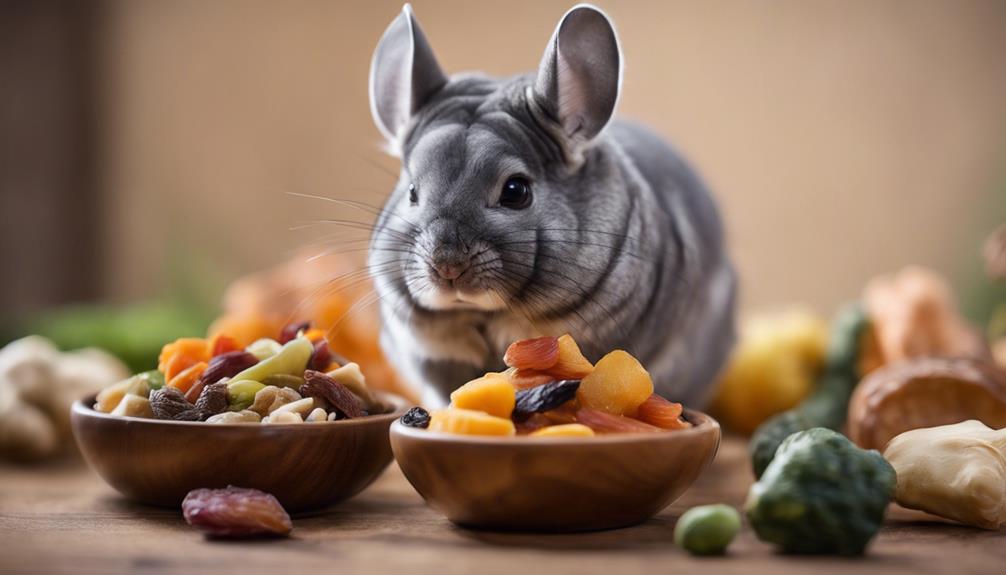
For optimal chinchilla health and wellness, it’s crucial to offer treats in moderation to prevent potential health issues. When providing treats to chinchillas, it’s essential to consider healthy snack options and practice portion control to maintain their well-being. Here are some key points to keep in mind:
- Variety: Offering a variety of healthy snack options can prevent dietary imbalances and provide essential nutrients for your chinchilla’s overall health.
- Portion Control: Limiting the amount of treats given ensures that your chinchilla maintains a balanced diet and doesn’t consume excessive calories.
- Nutritional Balance: Opt for treat alternatives that contribute to the chinchilla’s nutritional balance, such as hay-based treats or small pieces of dried fruits and vegetables.
- Special Occasions: Reserve special treats for occasions like bonding sessions or training to reinforce positive behavior without overindulging.
Foods to Avoid: Harmful Substances
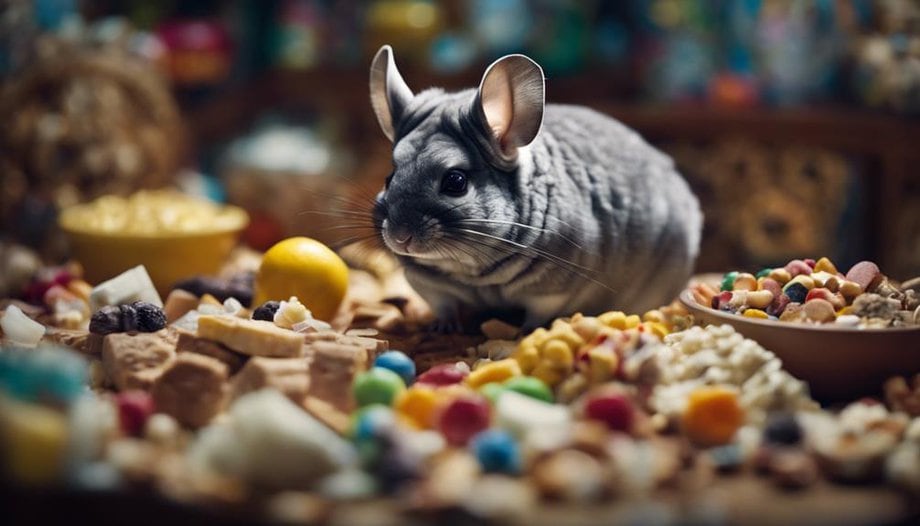
Chinchilla owners must be vigilant in identifying and steering clear of foods containing harmful substances that can jeopardize their pet’s well-being. Toxic plants like azaleas, daffodils, and tulips should be kept far away from chinchillas as they can cause digestive issues or even be fatal if ingested.
Additionally, certain fruits and vegetables, such as avocados and onions, can be toxic to chinchillas and should be strictly avoided. Chinchillas have sensitive digestive systems, and feeding them a balanced diet is crucial for their overall health and well-being.
It’s essential to provide safe treats like small pieces of dried fruits or hay-based treats in moderation to prevent digestive disturbances. Maintaining a diet that supports digestive health is key to ensuring that chinchillas thrive and lead happy, healthy lives.
Feeding Schedule: Consistency Matters
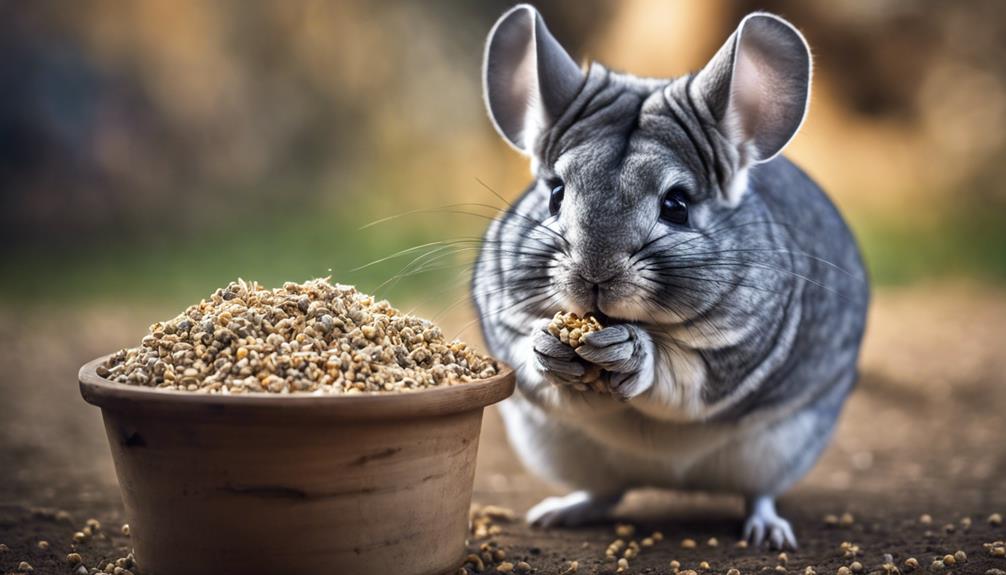
Maintaining a consistent feeding schedule is crucial for the health and well-being of chinchillas. Feeding consistency plays a significant role in providing chinchillas with the necessary nutrients and ensuring they thrive. Here’s why a structured mealtime routine is essential for their health:
- Health Benefits: Consistency in feeding helps regulate a chinchilla’s digestive system, preventing issues like gastrointestinal stasis and obesity.
- Dietary Balance: A regular feeding schedule ensures that chinchillas receive a well-rounded diet, including hay, pellets, and occasional treats, promoting overall health and vitality.
- Emotional Well-being: Predictable meal times create a sense of security for chinchillas, reducing stress and promoting a positive environment.
- Prevention of Selective Eating: By feeding chinchillas at consistent times, they’re less likely to become picky eaters, ensuring they consume all essential nutrients for optimal health.
Frequently Asked Questions
Can Chinchillas Eat Fruits and Vegetables as Part of Their Diet?
Chinchillas can eat fruits and vegetables in moderation as part of their diet. However, it is crucial to maintain nutrient balance and be mindful of the sugar content to prevent digestive issues. Portion control is key for their well-being.
How Often Should Chinchillas Be Given Treats, and What Are Some Healthy Treat Options?
When treating chinchillas, moderation is key. Healthy options like rose hips, dried herbs, or a nibble of hay-based treats can be given occasionally. Balancing nutritional value with indulgence keeps these furry friends happy and healthy.
Are There Any Specific Foods That Chinchillas Should Never Be Fed Under Any Circumstances?
Chinchillas should never be fed toxic foods like chocolate, caffeine, garlic, onions, or nuts. Chinchilla pellets are essential for their diet. Safe treat options include hay varieties like timothy, orchard grass, and meadow hay.
Should Chinchillas Be Given Vitamin Supplements in Addition to Their Diet?
Chinchillas should not be given vitamin supplements without consulting a veterinarian. Excessive vitamins can lead to health issues. It’s vital to follow dietary guidelines and recommendations to prevent vitamin deficiencies and associated risks in chinchillas.
How Can I Tell if My Chinchilla Is Not Eating Enough or Is Having Trouble With Their Diet?
Monitoring a chinchilla’s eating habits is crucial for their well-being. Weight changes, reduced food consumption, or unusual behavior can indicate diet issues. Regular health indicators and veterinary advice are essential to ensure the chinchilla’s health.











